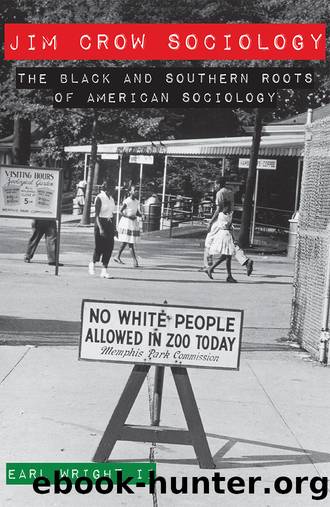Jim Crow Sociology by Earl Wright

Author:Earl Wright [Wright, Earl]
Language: eng
Format: epub
ISBN: 9781947602571
Google: 83c9wQEACAAJ
Publisher: University of Cincinnati Press
Published: 2020-01-15T05:25:21+00:00
Fisk University
Fisk University was established in Nashville, Tennessee in 1866. Nashville was thought to be an appropriate location for the American Missionary Association-backed school because it is centrally located in the corridor between northern and southern regions known during the Civil War as border states. The city was thought to be ideal because some believed it was more tolerant of northern sensibilities and carpetbaggers than towns located deeper in the South. The cityâs seemingly open embrace of its northern brethren was why the schoolâs founders openly proclaimed âNashville was âa nostrilâ through which the state had âlong breathed the Northern air of free institutionsâ.â2
Knowledgeable concerning Nashvilleâs relative openness to interracial cooperation, but fully aware of their location Up South, Fiskâs leaders worked feverishly to establish positive relationships with the cityâs White community. This was a primary objective upon the schoolâs establishment because Fiskâs founders were well aware of the anger and resentment of some Whites toward the promotion of education for Black Americans who, after graduation, would dare believe themselves equal to or better than Whites, if they already had not prior to earning their degree. The racial climate of the Reconstruction Era in America was so vile, even in Nashville, that it was not beyond reason that a White southerner so offended by the idea that a Black person would overtly assert their human equality would extend some sort of violence, and possibly death, upon the person(s) by whom he believed he was offended. In an effort to minimize the possibility of race-based violence at his newly established institution and against the students being educated there when they ventured beyond campus:
[Fisk University] President Cravath and his associates moved among Southern leaders who entertained convictions different from their own, winning the respect and confidence of many without compromising their own belief in the fundamental equality of individuals before both God and man.3
Among audiences not keen on providing resources or opportunities for Black Americans to practice or gain agency over their lives, Fiskâs founders allayed many of the more extreme and exaggerated concerns of their new neighbors. Nevertheless, the Ku Klux Klan, established two years prior to the school in a small town located only a short distance from Nashville, occasionally held marches near Fisk. For the most part, the efforts of the schoolâs founders to establish a barrier between its students and dangerous White citizens was successful.
One must be mindful that many HBCUs established during this period, while tagged with the name âcollegeâ or âuniversity,â offered curriculums ranging from elementary school to college. To many Black Nashville residents, Fisk represented their first opportunity to become formally educated. The establishment of a tuition-free school to educate Blacks one year removed from passage of the 13th Amendment outlawing slavery was significant, since no such institution existed in Nashville prior to Fisk. That Nashville, with the stateâs largest Black American population at the time, did not have a system of free public education for its brown-skinned citizens may not have been a matter of concern for city leaders prior to the establishment of Fisk.
Download
This site does not store any files on its server. We only index and link to content provided by other sites. Please contact the content providers to delete copyright contents if any and email us, we'll remove relevant links or contents immediately.
Cecilia; Or, Memoirs of an Heiress — Volume 1 by Fanny Burney(32538)
Cecilia; Or, Memoirs of an Heiress — Volume 2 by Fanny Burney(31935)
Cecilia; Or, Memoirs of an Heiress — Volume 3 by Fanny Burney(31925)
The Great Music City by Andrea Baker(31911)
We're Going to Need More Wine by Gabrielle Union(19032)
All the Missing Girls by Megan Miranda(15925)
Pimp by Iceberg Slim(14476)
Bombshells: Glamour Girls of a Lifetime by Sullivan Steve(14046)
For the Love of Europe by Rick Steves(13868)
Talking to Strangers by Malcolm Gladwell(13341)
Norse Mythology by Gaiman Neil(13332)
Fifty Shades Freed by E L James(13228)
Mindhunter: Inside the FBI's Elite Serial Crime Unit by John E. Douglas & Mark Olshaker(9313)
Crazy Rich Asians by Kevin Kwan(9271)
The Lost Art of Listening by Michael P. Nichols(7487)
Enlightenment Now: The Case for Reason, Science, Humanism, and Progress by Steven Pinker(7303)
The Four Agreements by Don Miguel Ruiz(6739)
Bad Blood by John Carreyrou(6609)
Weapons of Math Destruction by Cathy O'Neil(6260)
